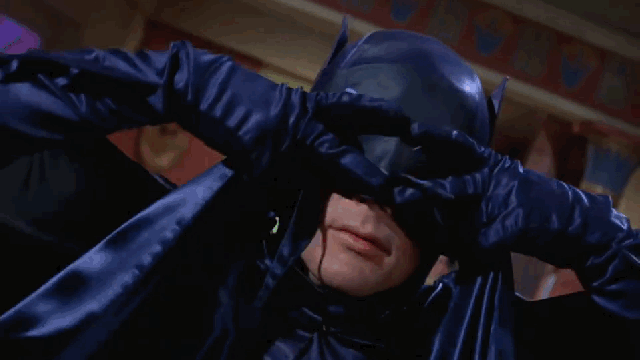It’s not an exaggeration to say that Adam West helped save Batman and changed what was possible with DC Comics’ Dark Knight Detective.
We live in an age where high-stakes, big budget superhero movies and TV shows are an inevitability. They have been coming for decades and will seemingly be a staple of Hollywood’s output for years to come. Fans of Superman, Spider-Man and Wonder Woman owe that inevitability to Adam West, who passed away on Friday night.
Yes, there were superhero film serials, TV shows and cartoons before the 1966 Batman TV Show but it was exponentially more successful than anything that preceded it.
1966 Bat-Mania was a fever of public fascination, one of the first times that a superhero property proved capable of creating multi-level discourse and fandom. Before the debut of the weekly Batman TV series starring Adam West and Burt Ward, sales of the Caped Crusader’s comics were abysmal. The camp aspect of the show either introduced adults to the Caped Crusader for the first time or rekindled the relationship to the character they once read as kids. Its infectious yet safe appeal let parents feel ok about letting kids watch it and indulging requests for toys, costumes and lunch boxes.
The cycles of marketing, merchandising, and journalistic/academic fascination that we take for granted now — with, say, Wonder Woman as a prominent example — hit a crucial evolutionary stage when Adam West was playing Batman. The show became something inescapable… and you just weren’t hip if you weren’t tuning into to the same Bat-channel at the same Bat-time.
Adam West’s performance was a major component of that endeavour’s success. Batman 1966’s winning mix of sly humour and straight-faced earnestness would have fallen apart without him. The inviting wholesomeness of West’s Bruce Wayne — that rich, plummy baritone, the commitment to absurd melodrama and fight scenes, the winks and smiles — lured sceptics in.
The show’s success at becoming a worldwide fascination proved that a superhero adaptation could reach a multivalent audience. Batman 1966 opened the door for would-be imitators and follow-ups. With varying degrees of success, film studios and TV production companies attempted to generate their own superhero fare, all chasing the kind of omnipresent zeitgeist that the ABC series generated.
Without Adam West as Batman, we never get Christopher Reeves as Superman, Lou Ferrigno as The Hulk or the 1970s Spider-Man show. Without the jokey, can’t-take-it-serious tone of the first TV live-action Batman, you’d never have Denny O’Neil and Neal Adams charting a moody, atmospheric return to the character’s pulp inspirations. That sea change feeds directly into Frank Miller’s psychologically grimy execution seen in Batman: The Dark Knight Returns and Batman: Year One. A crop of must-read Bat-interpretations lives between the two poles of camp and grim-n-gritty, pulling from either end of the spectrum.

Take the visual boldness and canny self-awareness of Steve Englehart and Marshall Rogers’ tenure. A classic story like 1977’s “The Laughing Fish” — where the Joker goes on a killing spree when he can’t copyright fish with his signature grin — arguably doesn’t happen without the wackiness of Batman 1966 as a precedent. Mike Barr and Alan Davis’ stories highlighted a Batman-Robin relationship that felt like it took cues from the deep bond communicated by West and Ward’s performances. Alan Grant and Norm Breyfogle’s lean, angular take on Batman in the 1990s still found places for sardonic humour, as with hardboiled detective Joe Potato, and that’s partially because Adam West gave audiences a Batman who laughed and smiled.
The importance comes from contrast and the availability of a variegated palette. Adam West’s energetic embodiment helped manifest a spectrum of possibility for Batman. For years, DC Comics put out scads of smiling, out-in-the-daytime Bat-stories created by Bill Finger, Dick Sprang Sheldon Moldoff, and others. Adam West’s Batman firmly established that a non-brooding, approachable Batman — a take fermented from those stories — could be a viable approach for character borne of gothic tragedy.
Furthermore, the actor’s turn as Batman gave us a character that reminded us that escapism was part of the appeal of superheroes. He was having fun being gravely committed and had the skill to sprinkle in moments where the stoic focus slipped and hi-jinks could be had. Adam West gave us a Batman who was dedicated to justice without it having to cost him his soul. In an era where so much superhero genre fare takes itself too seriously, his performance of the Dark Knight remains a lesson we shouldn’t ever forget.
